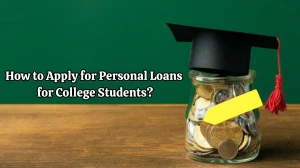
Best Private Student Loans of November 2023
The best private student loans in November 2023 offer competitive rates and flexible terms, with options like Rhode Island Student Loan Authority, Ascent, SoFi, A.M. Money, College Ave, Funding U, Discover, PNC Bank, and Citizens Bank.
by Kowsalya
Updated Nov 06, 2023
On This Page
- Best Private Student Loans of November 2023
- How Do Student Loans Operate?
- How Can I Obtain a Private Student Loan?
- How Can One Apply for a Student Loan for College?
- What Factors Help in Choosing the Right Private Student Loan?
- What Are the Advantages and Disadvantages of Taking Out Private Student Loans?
- Is a Co-signer Needed for Obtaining a Private Student Loan?
Best Private Student Loans of November 2023
In November 2023, several private student loan options were evaluated, each offering varying variable and fixed APR rates. Here's a snapshot of the top private student loans, highlighting their competitive interest rates and terms for prospective borrowers.
|
Company |
Variable APR |
Fixed APR |
|
Rhode Island Student Loan Authority |
N/A |
5.79% to 8.74% |
|
Ascent |
6.15% to 16.08%* |
4.83% to 16.16%* |
|
SoFi |
5.99% to 13.97%* |
4.44% to 14.70%* |
|
A.M. Money |
N/A |
8.34% to 8.87% |
|
College Ave |
5.59% to 16.99% |
5.05% to 16.99% |
|
Funding U |
N/A |
7.49% to 12.99% |
|
Discover |
6.37% to 16.62% |
4.49% to 14.99% |
|
PNC Bank |
6.14% to 15.64% (including 0.50% discount for automatic payments) |
4.39% to 13.89% (including 0.50% discount for automatic payments) |
|
Citizens Bank |
5.82% to 13.97% |
4.43% to 12.57% |
Rhode Island Student Loan Authority: This loan option offers competitive fixed APR rates ranging from 4.40% to 9.24%, providing students with a reliable source of funding for their education.
Ascent: Ascent offers flexible private student loans with variable APR rates starting from 6.15% and fixed APR rates from 4.48%, making it suitable for students seeking adaptable repayment terms.
SoFi: SoFi provides student loans with variable APR rates starting at 5.99% and fixed APR rates from 4.44%. It stands out with additional member benefits, making it an attractive option for borrowers.
A.M. Money: A.M. Money offers loans without a co-signer, featuring fixed APR rates between 8.34% and 8.87%, catering to students who don't have a co-signer available for their loan application.
College Ave: College Ave offers multi-year loans with variable APR rates ranging from 5.49% to 16.99% and fixed APR rates from 4.41% to 16.99%, providing financial support for students throughout their academic journey.
Funding U: This loan option offers private student loans with fixed APR rates between 7.49% and 12.99%, designed to assist academically strong students in their pursuit of higher education.
Discover: Discover provides no-fee loans with variable APR rates starting from 6.37% and fixed APR rates from 4.49%, making it a cost-effective choice for students looking to minimize additional fees.
PNC Bank: PNC Bank offers loans with variable APR rates ranging from 6.14% to 15.64% (including a 0.50% discount for automatic payments) and fixed APR rates from 4.39% to 13.89%, catering to borrowers seeking autopay discounts.
Citizens Bank: Citizens Bank provides loans with variable APR rates starting at 5.81% and fixed APR rates from 4.43%, offering competitive rates for borrowers who hold a Citizens Bank account.
How Do Student Loans Operate?
Navigating the complexities of student loans involves understanding their types, covered expenses, repayment terms, and individual lender policies, crucial knowledge for students and their families planning for higher education.
Types of Student Loans
Students and their parents have the option to borrow either private or federal student loans to finance higher education expenses.
Covered Expenses
Student loans can be used to pay for a range of school-related costs, including tuition, room and board, books, transportation, technology equipment, and common living expenses like food and utilities.
Repayment Terms
Repayment terms for student loans vary based on the lender. In most cases, loans do not enter the repayment phase until after the student has completed their education.
Duration of Repayment
Borrowers typically have the flexibility to choose a repayment term ranging from five to 20 years. Longer repayment periods are available, but they often come with higher interest rates.
Consideration of Interest Rates
Interest rates for student loans can vary based on the chosen repayment period. Longer repayment periods generally result in higher interest rates, impacting the overall cost of the loan.
Post-Graduation Repayment
Students usually start repaying their loans after leaving school, providing a buffer period to transition into the workforce before the financial responsibility of repayment begins.
Individual Lender Policies
Specific repayment terms, policies, and conditions can differ between lenders, making it essential for borrowers to understand the terms and conditions of their specific loan agreement.
Financial Planning and Decision-Making
Understanding the operation of student loans is crucial for students and their families when planning for higher education. It involves considering the type of loan, covered expenses, repayment options, and the impact of interest rates on the overall financial commitment.
How Can I Obtain a Private Student Loan?
In order to secure a private student loan to bridge the gap in your educational funding, follow these essential steps, from assessing your creditworthiness to choosing the right lender and understanding the loan terms thoroughly.
Assess Your Creditworthiness
Begin by evaluating your credit score to determine your eligibility for a private student loan. Lenders typically require a good credit history. Obtain a copy of your credit report and understand your financial standing before proceeding with the application.
Find a Co-signer if Necessary
If your credit is less than ideal or if you lack a stable source of income, consider securing a co-signer for your loan. A co-signer with a strong credit history can significantly enhance your chances of approval. Ensure clear communication with your co-signer regarding repayment responsibilities.
Research and Compare Lenders
Take the time to research various lenders, including banks, credit unions, and online lending institutions. Each lender offers different interest rates, fees, and repayment terms. Utilize prequalification options offered by some lenders to assess rates without affecting your credit score.
Choose the Best Offer
Carefully compare loan offers, focusing on key factors such as low interest rates, minimal fees, and flexible repayment options. Look for a loan that suits your financial situation and long-term goals. Once you find a suitable offer, proceed with the application process.
Complete the Application Process
When applying for a private student loan, be prepared to submit detailed information about your financial status. This may include documents such as W-2 forms, tax returns, identification, and proof of address. Fill out the application form accurately and provide all required documentation promptly.
Review and Sign the Loan Agreement
Upon approval, thoroughly review the loan agreement provided by the lender. Pay close attention to the interest rates, repayment terms, and any additional fees associated with the loan. Ensure you fully understand the terms before signing the agreement.
Step into the world of MarketsHost, your resource for financial insights. Unlock potential, make informed choices.
How Can One Apply for a Student Loan for College?
Here are the essential steps to navigate the student loan application process for college, ensuring a smooth and informed approach to securing your educational funding.
Review Your Finances and Credit
Start by understanding your financial situation and reviewing your credit. Private student loan lenders often require good to excellent credit. Obtain a free copy of your credit report from AnnualCreditReport.com and ensure all information is accurate. If your credit is not strong, consider finding a creditworthy co-signer, such as a parent or relative.
Gather Necessary Documents
Gather all the essential documents needed for your loan application. Typically, lenders require information such as your address, Social Security number, income details, employment information, and, if applicable, your co-signer's details. Having these documents ready can expedite the application process.
Research and Request Quotes
Research different private student loan lenders and understand their eligibility criteria, repayment terms, and interest rates. Request quotes from multiple lenders to compare their offers. Many lenders allow you to get quotes with a soft credit check, which doesn’t impact your credit score. Take your time to choose a loan option that best suits your needs.
Submit Your Application
Once you've selected a suitable lender, proceed to submit your loan application. If you have a co-signer, ensure they complete their application as well. The lender will review your application, perform a hard credit inquiry, and assess your eligibility. Be prepared to provide any additional information if required.
Review and Sign the Loan Agreement
If your application is approved, the lender will send you a loan agreement detailing the terms and conditions of the loan. Carefully review the agreement, including the interest rate, repayment schedule, and any fees involved. If everything meets your approval, sign the agreement to finalize the loan process.
What Factors Help in Choosing the Right Private Student Loan?
Here are the essential factors to consider when choosing the right private student loan, outlined under key subheadings to help you make an informed decision tailored to your financial needs and preferences.
Costs and Fees
Examine the interest rate type and potential fees such as application or late fees. Understanding these costs is crucial to calculate the true loan expense accurately.
Loan Products and Terms
Evaluate different lenders' offerings concerning the amount you wish to borrow, repayment periods, interest rates, and available plans. Comparing these terms helps you find a loan that matches your financial requirements and goals effectively.
Eligibility Criteria
Research lenders' specific requirements, including citizenship, enrollment status, age, and financial history. Meeting these criteria increases your chances of approval and ensures your application efforts are focused on viable options.
Additional Features and Benefits
Look beyond the basics and consider lenders' unique features, such as flexible repayment options or interest rate reductions under specific conditions. Choosing a loan with valuable perks can enhance your repayment experience and overall financial well-being.
What Are the Advantages and Disadvantages of Taking Out Private Student Loans?
Advantages of Private Student Loans
- Private lenders often offer better terms, including lower interest rates, to borrowers with excellent credit scores, reducing the overall cost of borrowing.
- Private student loans typically allow borrowers to access higher loan limits than federal loans, ensuring that more of the educational expenses can be covered.
- Private student loans, like other debts, are subject to a statute of limitations. This legal protection restricts the timeframe within which lenders can sue borrowers for non-payment.
- The application process for private student loans is generally quicker than federal loan applications, providing a faster source of funding for urgent educational needs.
- Private student loans can be an option for international students who might not qualify for federal financial aid, helping them finance their education abroad.
- If a student becomes ineligible for federal financial aid, private student loans offer an alternative means of funding to continue their education.
Disadvantages of Private Student Loans
- Private loans lack the income-driven repayment plans and federal loan forgiveness programs available with federal student loans.
- Many private student loans come with variable interest rates, which can fluctuate over time, potentially leading to higher repayment costs.
- Private loans lack federal subsidies that cover interest payments while borrowers are in school, increasing the overall repayment amount.
- Private lenders often demand a cosigner, particularly for borrowers with limited credit history, potentially putting the co-signer's credit at risk.
- Higher borrowing limits and easier access to funds might encourage students to borrow more than they can realistically repay, leading to financial strain after graduation.
- Unlike some federal loans, private student loan debt might not be discharged upon the borrower's death, potentially burdening the borrower's estate.
Is a Co-signer Needed for Obtaining a Private Student Loan?
Yes, a co-signer is typically needed for obtaining a private student loan when the borrower has no income, no credit history, or bad credit. Without a financial track record that includes bills in the borrower's name, such as credit cards, car loans, or utilities, demonstrating the ability to repay the loan becomes challenging. In such cases, a co-signer becomes essential to secure the loan.
The co-signer is required to have a stable income and excellent credit scores, often in the high 600s or better. By co-signing, the individual assumes responsibility for the loan if the borrower becomes unable to make payments.However, there are some private lenders who offer an alternative option. Instead of solely considering the borrower's creditworthiness, these lenders assess academic performance and future earning potential to gauge the borrower's capacity to repay the loan.
This approach allows certain students to apply for a private student loan without a co-signer, bypassing the typical credit-based requirements. It's important to note that the availability of this option can vary among lenders, and students should thoroughly research their options to determine the most suitable path based on their individual circumstances.
Best Private Student Loans of November 2023 - FAQs
1. What are the typical expenses covered by private student loans?
Private student loans can cover tuition, room and board, books, transportation, technology equipment, and living expenses.
2. When do I start repaying my private student loan after graduation?
Repayment usually begins after leaving school, allowing a transition period into the workforce.
3. Can I get a private student loan without a co-signer?
Some lenders like A.M. Money offers loans without a co-signer, although having one might improve approval chances.
4. How do I assess my eligibility for a private student loan?
Assess your creditworthiness and consider finding a co-signer if your credit history is not ideal.
5. What factors should I consider when choosing a private student loan?
Consider interest rates, repayment flexibility, customer service, co-signer release options, and lender credibility when making your decision.




